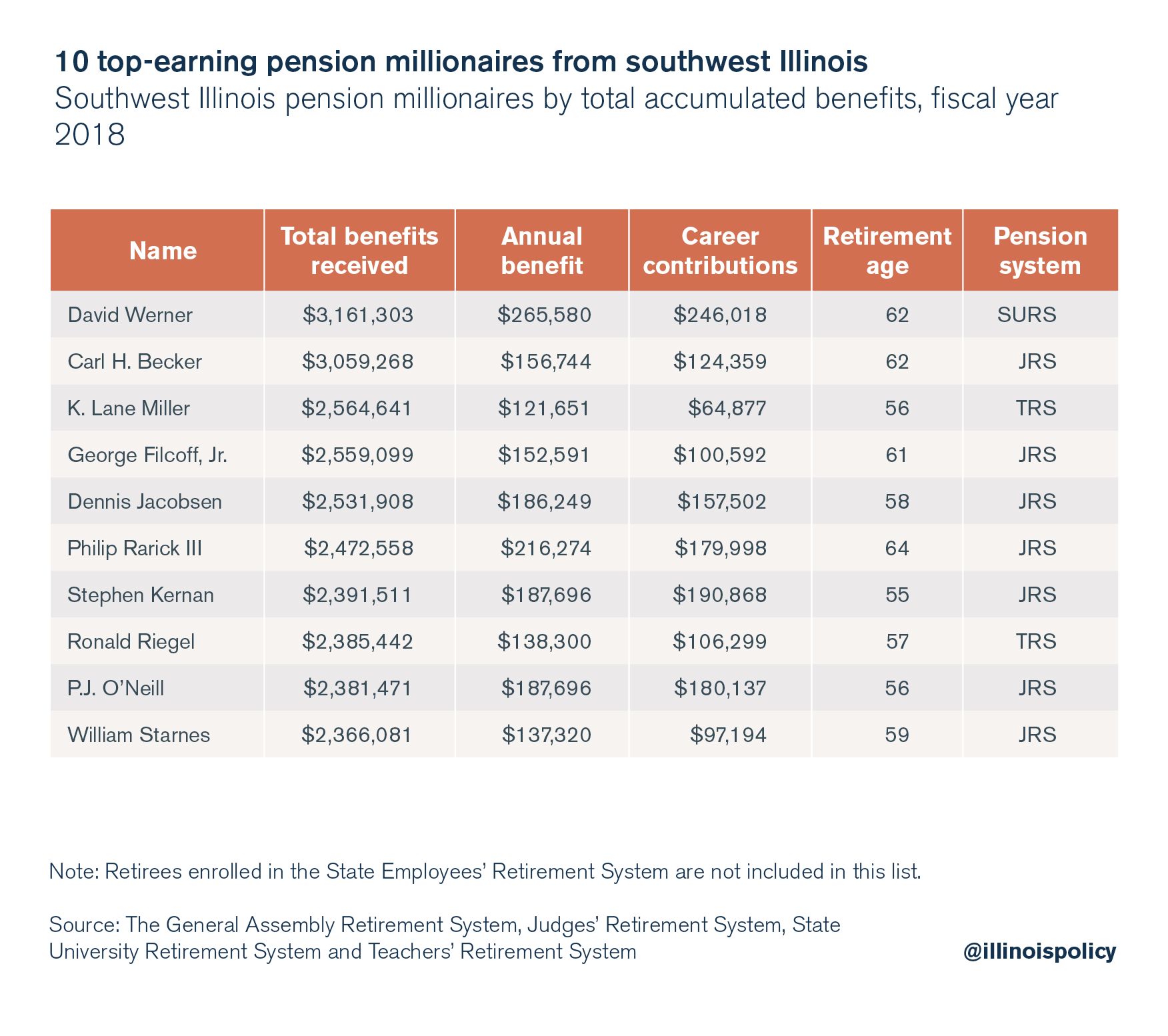If you’re looking for a solid retirement investment in southwestern Illinois, nothing will offer returns like a public pension. But this great deal for current government retirees comes at a great cost for taxpayers, and jeopardizes future government employees’ retirement income.
In southwestern Illinois alone, 340 retirees enrolled in five of the state’s largest pension systems have collected at least $1 million in pension benefits during the course of their retirements. Among them, 34 have hit the $2 million mark.
And two of those retirees hit the $3 million mark by the end of fiscal year 2018, according to state pension data.

Retired Southern Illinois University Edwardsville Chancellor David Werner has collected nearly $3.2 million in benefits since 2004. Werner took in $265,580 this past year, meaning he received more in one year than he contributed during 36 years of work. His total pension contributions were $246,018.
In another three years, Werner will have received $4 million total.
The other top pensioner is retired 20th Judicial Circuit Judge Carl H. Becker at $3.1 million. During 28 years of work, he contributed a total of $124,359 toward his retirement, or 4 percent of what he’s received.
All told, 492 government retirees in southwestern Illinois each pull in more than $100,000 a year from the pension systems, most of whom are former educators drawing from the Teachers’ Retirement System and the State Universities Retirement System. Other six-figure pensioners pull from the Judges’ Retirement System, the General Assembly Retirement System of Illinois and the Illinois Municipal Retirement System.
Not included among those pensioners, however, are retired state workers participating in the State Employees’ Retirement System, or SERS. Data from SERS did not include location information.
Southwest Illinois’ 492 six-figure pensioners have received $612.5 million in pension benefits combined. Meanwhile, those retirees contributed a combined $74.3 million to the pension systems – just 12 percent of their total retirement benefits. The rest of their benefits come from taxpayers and investment returns.
That might be a great deal for these retirees, but taxpayers can’t afford to shoulder the costs. Excessive pension benefits are simply unsustainable in a state carrying between $133.7 billion and $250 billion in unfunded pension debt. Pension and health care costs for government workers now eat 25 percent of the state’s general fund revenues. At the local level, the growth in pension costs is driving municipalities– such as Peoria and Harvey– to lay off municipal workers, including police and firefighters, and to hike property taxes.
In a state with nearly 7,000 units of local government, it should come as little surprise that there are 667 government pension systems in Illinois. Even the smaller pension systems subject taxpayers to tax hikes. In 2017, for example, the city of Belleville’s police and fire pension obligations drove the city to increase its property tax levy by $1.2 million.
Illinoisans’ tax burden will only increase as pension costs continue crowding funds out of municipal budgets. To deliver tax relief, and restore retirement security for government workers, state lawmakers must amend the Illinois Constitution to allow for the following reforms:
- Increase the retirement age for younger workers.
- Cap maximum pensionable salaries.
- Replace permanent compounding benefit increases with true cost-of-living adjustments, or COLAs.
- Implement periodic COLA holidays to allow inflation to catch up to past benefit increases.
- Enroll all newly hired employees into 401(k)-style retirement plans, similar to what’s available to state university employees, which would ensure government worker retirements are predictable and sustainable going forward.